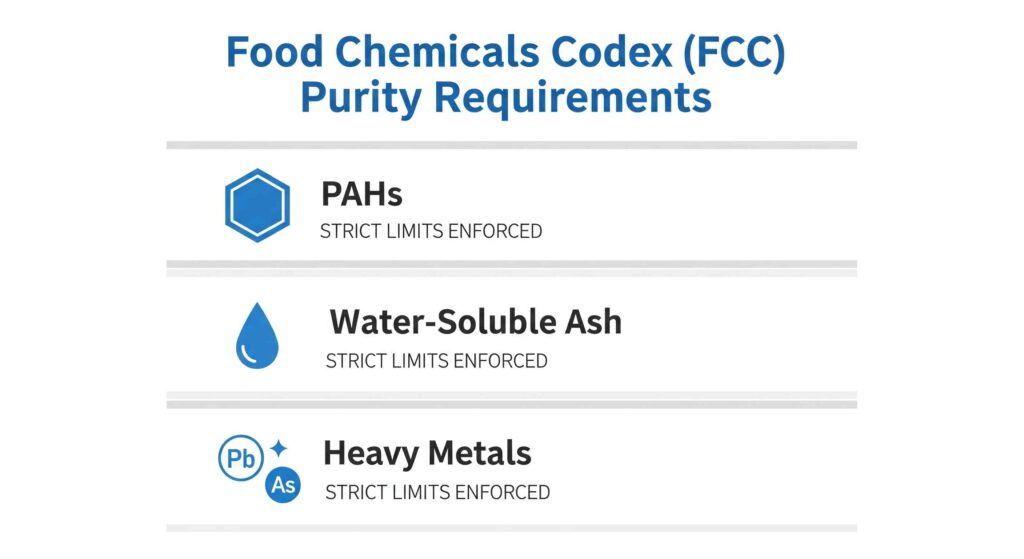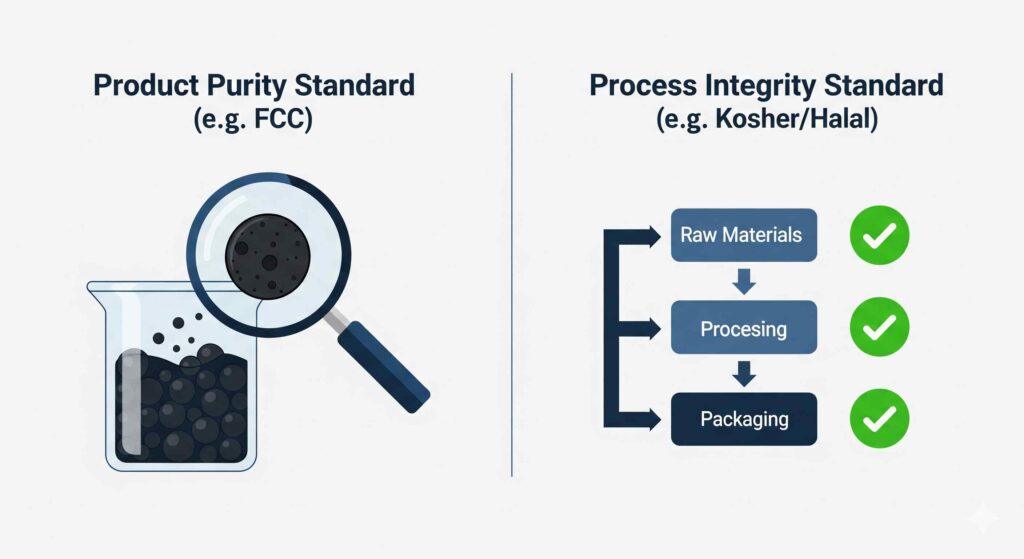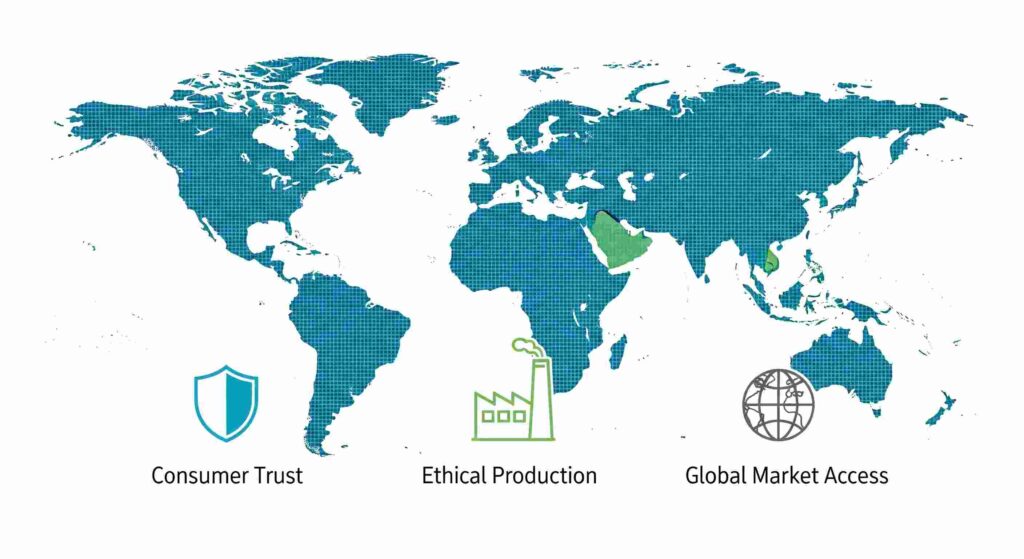Beyond the Label – Defining “Food Grade” Purity
Material specification is a matter of absolute precision for process engineers in the food, beverage, and pharmaceutical industries. The term “food grade” activated carbon is not a generic marketing label; it is a technical designation signifying that a product is safe for direct or indirect contact with consumable products. This safety and purity are not assumed but are rigorously verified through internationally recognized standards and certifications. Understanding the nuances of these certifications—from baseline chemical purity to process-specific requirements—is essential for ensuring regulatory compliance, product quality, and consumer trust. This guide demystifies the key standards that define food-grade activated carbon.
The Foundation of Purity: The Food Chemicals Codex (FCC)

The primary standard that establishes an activated carbon product as “food grade” is the Food Chemicals Codex (FCC). The FCC is a compendium of standards used to verify food ingredients’ identity, quality, and purity. Rather than focusing on the manufacturing process, the FCC monograph for activated carbon sets strict, testable limits on the final product to ensure it does not introduce harmful impurities into the food it is meant to purify.
Key purity requirements specified in the FCC monograph include stringent limits on:
- Heavy metals, such as lead and arsenic
- Polycyclic aromatic hydrocarbons (PAHs), which can be carcinogenic
- Water-soluble ash content
- Overall acid or alkalinity to ensure the carbon is pH neutral
Adherence to the FCC is the non-negotiable baseline for activated carbon in food processing applications.
For Water & Beverage Applications: Understanding NSF/ANSI 61
When activated carbon is used to treat drinking or process water that will become an ingredient in a final beverage product, an additional certification becomes critical: NSF/ANSI 61. This standard specifically addresses the health effects of drinking water system components.
What NSF/ANSI 61 Guarantees: This certification assures no harmful contaminants will leach from the activated carbon material into the water it treats. It is a safeguard against the filtration media becoming a contamination source.
When is it Mandatory? NSF/ANSI 61 certification is essential for municipal water treatment and is considered a best practice for any food or beverage application where water is a key ingredient, such as in producing soft drinks, juices, or bottled water.
Meeting Global Quality & Market Demands: Kosher and Halal Certifications
While the FCC and NSF standards focus on product safety and purity, Kosher and Halal certifications address the entire manufacturing process, from raw material sourcing to final packaging. For many global consumers, these certifications are viewed not just as religious designations but as markers of superior quality control, hygiene, and ethical production.

Kosher Certification Explained
What it means: A product with Kosher certification complies with Jewish dietary law. For activated carbon, the product is “Pareve” (contains no meat or dairy derivatives), and every processing aid or cleaning agent used during its manufacture has also been verified as kosher. Unlike purity standards that only test the final product, Kosher certification concerns every process step.
Business Value: This certification provides access to the significant kosher food market and appeals to a broader base of consumers who associate the stringent oversight with higher food safety and quality.
Halal Certification Explained
What it means: A Halal-certified product is “permissible” under Islamic law. This requires adherence to strict hygiene standards and guarantees the product is free from any forbidden (haram) substances, such as pork derivatives or alcohol. The certification process involves a comprehensive audit of the production facility, raw materials, processing, and handling to ensure no cross-contamination.
Business Value: Halal certification is crucial for exporting products to Muslim-majority countries and builds consumer trust. The Halal seal is widely regarded as a guarantee of purity, ethical production, and meticulous traceability throughout the supply chain.

At-a-Glance: Comparing Food-Related Certifications
For a process engineer or procurement manager, quickly understanding the scope of each certification is key. This table summarizes the primary focus and guarantee of each standard.
| Certification | Primary Focus | Guarantees | Common Application |
|---|---|---|---|
| Food Chemicals Codex (FCC) | Product Purity: Freedom from specific chemical and heavy metal contaminants. | Baseline for all food/beverage ingredients. | All food and beverage ingredients |
| NSF/ANSI 61 | Water Safety | Will not leach harmful substances into drinking water. | Potable water treatment, beverage production |
| Kosher | Process & Sourcing | Free from non-kosher ingredients and cross-contamination. | Food ingredients for the kosher market |
| Halal | Process & Sourcing | Is free from haram substances; it ensures hygiene and traceability. | Food ingredients for the global Halal market |
People Also Ask (FAQ Section)
1. Does the raw material (e.g., coconut, wood, coal) matter for food-grade certification?
The certification itself applies to the purity and safety of the final product, not the raw material source. However, raw materials like wood are commonly used to produce the high-purity activated carbons required for sensitive food and pharmaceutical applications. Ultimately, any raw material can be used as long as the finished product passes the stringent tests outlined by the FCC.
2. Can I use any activated carbon for my aquarium?
While not a formal food-grade application, activated carbon in aquariums must be of high purity to be safe for aquatic life. Hobbyists are often concerned about fine powders potentially harming fish gills and the possibility of the carbon leaching phosphates, which can cause algae blooms. Therefore, it is highly recommended to use a quality granular activated carbon specifically designed and rinsed for aquarium use.
3. Is all “food-grade” activated carbon also Kosher and Halal?
No, not automatically. A product can meet the chemical purity standards of the Food Chemicals Codex (FCC) without having undergone the separate, process-based audits required for Kosher or Halal certification. These are distinct certifications that must be obtained independently and will be explicitly stated on the product’s documentation.
4. How can I verify a supplier’s certification claims?
Always request a Certificate of Analysis (CofA) for the specific lot of product you are purchasing. You can often verify a manufacturer’s listing on the certifying body’s official website for public standards like NSF. For Kosher and Halal certifications, the product packaging or technical data sheet should bear the official symbol of the certifying agency.

